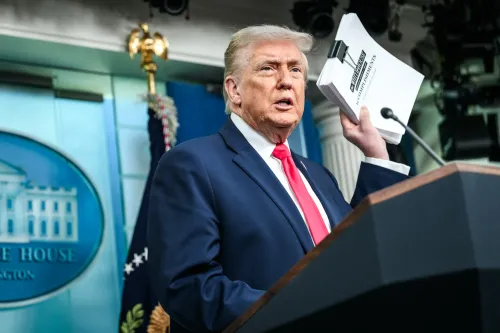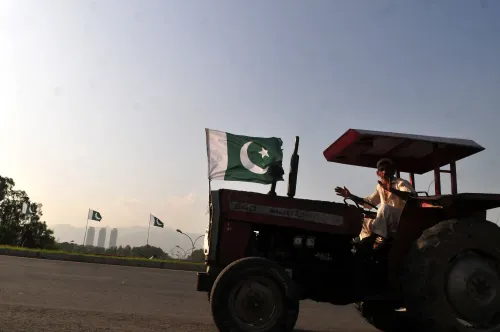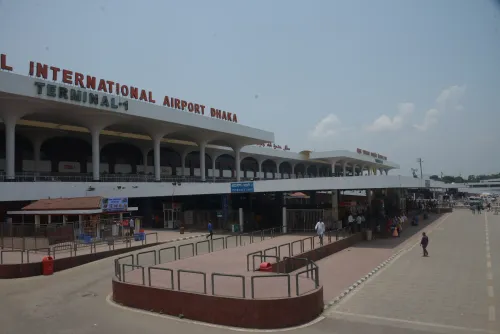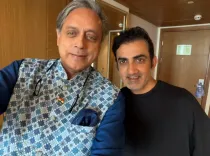Why are Islamic radical parties gaining influence in Bangladesh under the Yunus-led government?
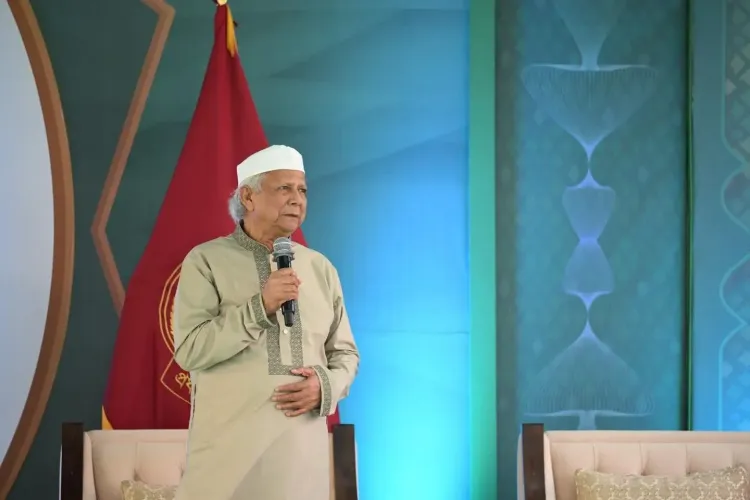
Synopsis
Key Takeaways
- Hefazat-e-Islam has issued a 12-point demand during a large rally.
- Key demands include the abolishment of the Women's Affairs Reform Commission.
- Plans for nationwide protests are set for May 23.
- The group is pushing for a trial of the Awami League before elections.
- Islamic teachings are proposed to be mandatory in schools.
New Delhi: The Bangladeshi Islamist organization Hefazat-e-Islam (HeI) has unveiled a 12-point demand during a rally at Suhrawardy Udyan in Dhaka this past weekend, attracting thousands of supporters.
Among its demands, HeI is calling for the immediate dissolution of the Women's Affairs Reform Commission and the implementation of women’s development aligned with Islamic culture, history, and traditions. They are also seeking the trial of the Awami League (AL) prior to the upcoming general elections, the repeal of media reforms, and the withdrawal of penalties for blasphemy, along with the prosecution of the individuals responsible for the murder of lawyer Saiful Islam Alif from Chattogram.
Additional requests from HeI include the dismissal of false charges against religious scholars and ordinary citizens, the identification and trial of those who utilized the 'terrorist' label, and exerting diplomatic pressure on India and Israel.
HeI's agenda also encompasses mandatory Islamic teachings from primary education through higher studies, safeguarding national interests by canceling the humanitarian corridor decision to Rakhine, and classifying the Qadiani sect as non-Muslim, similar to actions taken by Pakistan and other Muslim nations.
Mufti Jashim Uddin of HeI stated, "In a nation where 95% of the populace are Muslims, pluralism is unacceptable. Governance must reflect unity or Tawhid."
HeI has scheduled nationwide protests for May 23 to amplify their demands. Notable speakers included Mahfuzul Haque, Abdul Awal, Hazrat Anas, Junaid Al Habib, Ahmad Abdul Quader, and Mamunul Haque.
Separately, HeI and affiliated Islamic factions have called for a ban on various activities they deem "anti-Islamic", such as music, theater festivals, women’s football matches, and kite-flying celebrations.
It’s important to remember that in May 2013, HeI was at the center of a significant confrontation at Shapla Chattar in Motijheel, Dhaka, resulting in the deaths of at least 58 individuals, including seven security personnel. Sheikh Hasina and 33 others were subsequently charged with "mass killing" in connection with this incident.
During that time, the Shahbagh movement was gaining momentum, unsettling the Awami League, as the Shahbagh activists were perceived to be appropriating their Liberation War heritage. The Shapla Chattar incident was likely manipulated by the government to simultaneously suppress the Shahbaghis and reassert control over HeI, which had been supported to attract a segment of Islamic hardliners. HeI served as a strategic political asset to counter the Bangladesh Nationalist Party (BNP) and Bangladesh Jamaat-e-Islami (JeI).
Established in 2010 by parties and scholars affiliated with various madrassas in Chattogram, HeI emerged in response to the 2009 draft of the Women's Development Policy, which aimed to grant women equal inheritance rights. Following intense protests from HeI, the parliament later approved a diluted version that merely enhanced women’s rights over acquired property.
The former HeI leader, Shah Ahmad Shafi, had a cooperative relationship with the Awami League government. Since Shafi's passing in September 2020, a more extreme faction led by Junaid Babunagari rose to prominence in November 2020. Following Babunagari's death in August 2021, Muhibullah Babunagari was appointed Amir of HeI on August 19, 2021.
Interestingly, HeI has traditionally opposed the Jamaatis, yet has become somewhat accommodating towards them in the aftermath of the Hasina government’s ouster.
During Prime Minister Narendra Modi's visit to Bangladesh in March 2021, HeI orchestrated extensive protests that resulted in significant damage to Hindu properties and government establishments in Chattogram and Brahmanbaria. These protests led to attacks on trains, buses, and Hindu temples, claiming 12 lives. In October 2021, anti-Hindu riots erupted, resulting in nine fatalities and widespread destruction of homes and businesses. Alarmingly, anti-government protests in Bangladesh have often spiraled into violence against Hindus.
Following the departure of former Prime Minister Sheikh Hasina in August 2024, Islamic factions in Bangladesh, previously suppressed by the Awami League government, are now gaining ground in the political landscape. Notably, the constitution of Muslim-majority Bangladesh is rooted in the four principles of nationalism, socialism, democracy, and secularism.
Local media reports indicate that certain radical Islamic leaders, under the banner of Jatiya Olama Mashayekh Aemma Parishad, have cautioned that the Yunus-led administration will face swift repercussions if it continues with reforms.
Under the Yunus government, Islamic entities are feeling increasingly empowered, engaging in activities that accommodate and promote jihadist ideologies. They perceive an opportunity amidst the ongoing political chaos and are adopting a more aggressive stance with frequent violent protests and campaigns advocating a radical Islamic agenda to reshape Bangladeshi politics and society. The Yunus administration has largely permitted these actions.
Meanwhile, the leadership of BNP is dissatisfied with its former ally, JeI, for taking an independent and divergent stance after August 2024. JeI is viewed as supporting the Interim government led by Yunus and is seen as favoring a postponed election. BNP believes this may be a tactical maneuver by JeI to strengthen its organizational network and position itself as a formidable force in Bangladeshi politics. The Jamaatis are no longer content to remain subordinate to the BNP and are reluctant to continue as junior partners.
In response, the BNP is actively courting smaller Islamic parties to forge a broad-based political coalition, aiming to ensure its dominance in Bangladesh's political arena. Although these Islamic parties possess regional strength and dedicated support, they lack a nationwide base. Nonetheless, their capability to instigate unrest and mobilize on issues of interest remains significant. The BNP is working to harness these street-level forces in anticipation of an impending political confrontation with the Yunus administration over electoral matters.
(The author is a South Asia and Eurasia expert with prior affiliations to the Manohar Parrikar Institute for Defence Studies and Analyses. The views expressed here are personal.)


